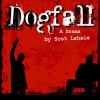The current production in N.C. Stage’s Catalyst Series, Dogfall is Sanguine Theatre Troupe’s apparent debut in Asheville. The play was written by troupe member Scot Lahaie, who also acts in the production. Essentially a issue play, Dogfall explores the right-to-die controversy, from two extreme standpoints, each of which hold the power at different times during the play. The uneven production never quite gains the momentum it needs, mired in script issues and deficient direction, and in the end the punch the production hopes to delivers is largely deflated.
The play takes place in Mike’s apartment, a dingy, messy room with walls covered in newspaper clippings. We meet Mike as he wheels a large laundry basket through the door and talks with his neighbor Mrs. Banocek. Once his neighbor leaves, he reveals a kidnapped Dr. Jake McKenzie inside the laundry basket. Dr. McKenzie is a Dr. Kevorkian type doctor, assisting terminally ill patients in ending their suffering as he sees it, or as Mike sees it, murdering them. Mike has abducted McKenzie in order to put him on mock trail, and then execute him with a version of his own death machine. McKenzie attempts to defend himself but is continually silenced by Mike, who is completely uninterested in his side of the story. Halfway through the play, McKenzie manages to free himself from his restraints while Mike is sleeping, and rather than running from the apartment to the police, he turns the tables on Mike and sets about his defense, while Mike is now in the position of restraint and facing imminent execution.
Bradley James Archer plays Mike, and somehow despite his energetic performance, manages to not hit the right tonal notes needed for the part. Rather than coming across as threatening, menacing or even just plain crazy, Archer’s portrayal has an odd goofiness about it, as if Mike has had too many cups of coffee and can’t calm down, he’s so excited. This odd energy also affected Archer’s lines, which tumbled out too quickly at times, words getting garbled and lost. Scot Lahaie, in the role of Dr. McKenzie, lacked a necessary intensity, seeming underwhelmed and merely irritated at being kidnapped and subjected to an unfair trial.
Perhaps the acting misfires can be traced to director RaChelle Cheeks, as the production as a whole was missing the energy that should be present when there is a big death contraption onstage the entire time. Absent were the necessary builds in tension and action to propel the show forward, and both actors kept largely similar levels of vocal and physical energy throughout the show.
The script provides the necessary meatiness needed when dissecting a hot issue, but overall the language is not colloquial enough, visceral enough for the situation at hand. Dr. McKenzie’s defense came across sounding more like a proofread essay rather than the intense, passionate defense of a hostage fighting for his life. The audience never really gets to know Mike and why he’s gone to such extremes for his beliefs, leaving his character undeveloped, unsympathetic and flat. Finally, the inclusion of the neighbor character, Mrs. Banocek, who is onstage for all of five minutes and hardly furthers the plot, was superfluous.
While the euthanasia dilemma is still a contentious topic in need of further exploration, Dogfall ultimately fails to get to the depths of both sides of the arguments. The Sanguine Theatre Troupe’s production runs through January 23 at N.C. Stage.
The Sanguine Theatre Troupe presents Dogfall, A Drama. by Scot Lahaie . Through Jan. 23. Friday and Saturday at 7:30 p.m. Sunday at 2 p.m. $15 for Adults, $10 for Students and Seniors . http://www.ncstage.org




A very direct evaluation, and an interesting contrast with the review in the Citizen-Times.
The main problem I found with this production was the script. Neither character gained a new understanding of the opposing position or changed as a result of the actions of the play. The two main characters yelled at each other and alternately threatened and tormented each other. I kept waiting for them to connect in some way. I waited for each to discover something in the other man’s experience that would prompt self-reflection or at least a fissure in his certainty of rightness. It didn’t happen.